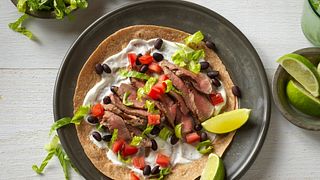Higher Protein Diets with Lean Beef Can Support Weight Loss and Improved Body Composition, Leading to Improved Type 2 Diabetes Status in Adults
At a time when people are increasingly interested in adopting higher protein diets because of their demonstrated benefits such as appetite control and improved body composition, this study shows two variations of higher protein diets, both with and without lean beef as the primary protein source, can effectively achieve weight loss and manage T2D. The study was funded by the National Cattlemen’s Beef Association, a contractor to the Beef Checkoff, which was not involved in the study design, interpretation, or publication.
“High-quality, clinical research has illustrated the benefits of higher protein diets as lifestyle-based interventions to support weight loss, yet research was needed to further explore the impact of these diets on adults with type 2 diabetes,” said study co-author James Hill, PhD, professor, The University of Alabama-Birmingham, Department of Nutrition Sciences, and director, Nutrition Obesity Research Center. “Importantly, beef is a preferred protein food for many Americans, and we know people are more likely to maintain a healthy diet if it is also satisfying and enjoyable. This long-term, clinical intervention study shows people can enjoy fresh lean beef four or more times a week, as part of higher protein diets that effectively support weight loss and manage type 2 diabetes.”
In the multi-site, randomized controlled trial, 71 study participants followed a higher protein (HP) diet with four or more 4- to 6-oz servings of lean beef per week (as the only source of red meat) or a normal protein (NP) diet with no red meat, for 52 weeks. The HP diet was composed of 40% protein, 32% carbohydrate, and 28% fat of total energy – while the NP diet was composed of 21% protein, 53% carbohydrate, and 26% fat of total energy (which is higher in protein than the average American diet, with protein intake averaging 14-16% of total energy). All participants had T2D and followed the State of Slim (SOS) weight management program, with both diets being reduced in calories and limited to food lists for each phase of the SOS program. In addition, participants worked up to exercising up to 70 minutes per day, six days per week.
Researchers assessed weight loss, body composition changes, and indicators of T2D status (e.g., glucose control). All study participants, regardless of their diet assignment, on average, lost weight with no statistical difference between groups. In addition, both groups experienced a reduction in fat mass percentage (HP: -4.3% and NP: -3.8%) and an increase in lean body mass percentage (HP: +4.2% and NP: +3.8%). Importantly, all participants significantly improved in key indicators of T2D: HbA1c and fasting glucose levels. At baseline, 74% of HP group and 62% of NP group had biomarkers in the range for T2D. At end of study, 38% of HP group and 39% of NP group no longer met diagnostic criteria for T2D.
“Type 2 diabetes is a growing public health concern, and this research demonstrates higher protein diets can be an effective tool in supporting weight loss and improving type 2 diabetes status,” added study co-author Drew Sayer, PhD, assistant professor, The University of Alabama-Birmingham, Department of Family and Community Medicine. “Importantly, this research illustrates higher protein diets can be flexible in managing type 2 diabetes, with protein intake at both 40% and 21% of calories – and with and without lean beef – to help people achieve goals based on their protein preferences. Diet can play a critical role in managing and reversing type 2 diabetes, and it’s particularly important that we offer science-based strategies to help people successfully follow diets with foods they enjoy.”
The study was funded by the National Cattlemen’s Beef Association, a contractor to the Beef Checkoff, which was not involved in the study design, interpretation, or publication.
" This long-term, clinical intervention study shows people can enjoy fresh lean beef four or more times a week, as part of higher protein diets that effectively support weight loss and manage type 2 diabetes."







